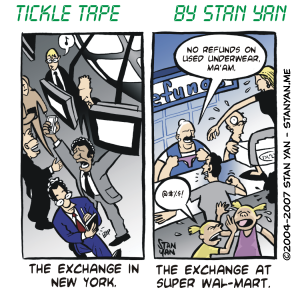Winning traders aren’t influenced by their emotions. The nature of trading demands an objective, logical approach. If one experiences extreme elation after a win and extreme disappointment after a loss, he or she will live as if riding an emotional rollercoaster: up and down, up and down. And usually, one’s account balance jumps up and down as well. Many novice traders understand intellectually what it means to control their emotions.
They can envision an emotionless being, such as the ultra-logical Mr Spock from “Star Trek.” But when it comes to putting the idea into practice, they find it isn’t very easy. As one novice trader put it, “How can you not get excited when you make a win and disappointed when you lose? It’s natural, and you can’t beat nature.” That’s a good point. It may not be easy. It may take a lot of practice, but it’s possible to control your emotions and achieve the objective, logical mindset that is conducive to profitable trading.
The most effective way to control emotions is to focus on concrete external influences. A significant way to control emotions, for example, is to use proper risk management. If you risk money you can’t afford to lose or risk too much of it, you’ll feel the pressure. On the other hand, if you minimize the amount of money you risk on a trade, you’ll be able to tell yourself that the actual downside is bearable; you’ll know you can easily survive the worst-case scenario. It’s also vital to have a detailed trading plan with clearly specified strategies for how you will enter and exit each trade. It’s also useful to place a protective stop so that you can feel a strong sense of security should the markets move against you.
A similar external source of emotional pressure is stress. If you are overly concerned with stressful life events, such as a death of a parent, moving to a new home, or problems with your spouse, you’ll use up precious psychological energy coping with these issues. And when you have limited energy for trading, you’ll have difficulty controlling your emotions. Emotion control and discipline take energy, and you must do everything you can to preserve the limited energy you have available. Don’t underestimate the powerful influence stressful events can have on your life. If you are under extreme stress, take a break from trading until you resolve long-term stressful events.
There are also internal events that cause emotions, the way you think about trading events. If you feel you must perform flawlessly on every trade, you’ll feel extreme pressure. You’ll tend to be easily fearful or disappointed by minor trading errors or routine trading losses. By accepting your limitations, on the other hand, you’ll feel more at ease. You don’t need to be perfect. You are allowed to make a few mistakes. As long as you limit your risk and trade a detailed trading plan, you will be on your way to success.
It’s important to remember that you are human. You can’t do more than humanly possible no matter how much you want to. Through patience and practise you’ll build the skills you need to be a consistently profitable trader.


